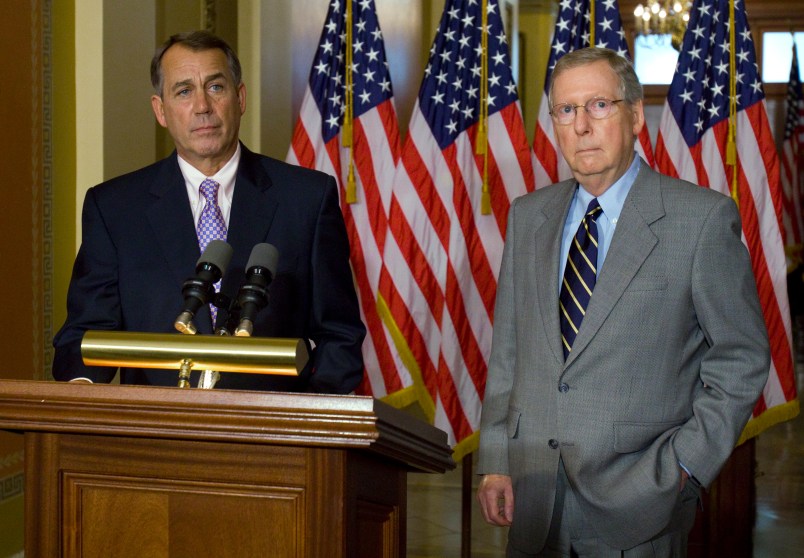Obamacare crossed the 7 million sign-ups milestone before the midnight deadline Monday, sparking angst and introspection among conservative policy wonks about the future of their quest to wipe the health care law off the books.
Central to their dilemma is the emerging discovery that many people will end up benefiting from Obamacare. Despite the health care law’s problems, unanswered questions and unknown costs, it can hardly be denied that millions of American are slated to reap the benefits of its insurance subsidies, the Medicaid expansion and beefed-up consumer protections.
And conservatives note the dangers this poses for the GOP’s promise of repeal. Staying the course means stripping coverage from as many as millions of newly insured, causing the sorts of disruptions and cancellations they’ve raised hell about since last fall. But abandoning the repeal mantra would constitute a monumental backtracking ahead of a promising mid-term election where Obamacare is a vulnerability for many Democrats.
“Even if the law remains broadly unpopular, Republicans will have have to deal with the fact that millions of Americans would have their coverage disrupted by repeal,” wrote Philip Klein, a senior writer for the conservative Washington Examiner. “And everybody knows how well it worked out for Obama when, at the height of last fall’s backlash against plan cancellations, he tried to downplay the millions of people being affected as only a small percentage of the population.”
Other conservatives warn of the impracticality of fully repealing Obamacare in the wake of the strong sign-up figures and — crucially — the seemingly sustainable (if not ideal) ratio of healthy to sick enrollees. It all but precludes the predictions that a “death spiral” of costly enrollees and rising premiums would collapse the law under its own weight.
Despite the caveats, “it’s clear now that one scenario with a lot of purchase among conservative opponents of Obamacare — that the law would ‘implode,’ ‘collapse’ or ‘unravel’ — is highly unlikely,” Ramesh Ponnuru, a senior editor for the conservative National Review, wrote Tuesday in a column for Bloomberg View.
Ponnuru gently chided Republicans for putting so much stock into their repeal push without coalescing around an alternative health care plan that protects peoples’ coverage. “The likelihood of replacement would be higher if there was an alternative that didn’t take away people’s insurance — one that promised to cover roughly as many people as Obamacare does, or even more,” Ponnuru wrote. “Opponents of Obamacare should always have been thinking along these lines. Now they have less and less choice.”
Republican leaders aren’t fazed. Senate Minority Leader Mitch McConnell (R-KY) referred to Obamacare as a “catastrophe” on Tuesday. Speaker John Boehner (R-OH) vowed that “House Republicans will continue to work to repeal this law.” House Budget Chair Paul Ryan (R-WI) allowed that the sign-ups were a “pyrrhic victory” but said the law was still a “fiasco.”
Luckily for them, Democratic lawmakers and candidates in conservative states remain spooked by Obamacare’s unpopularity with their constituents, and are treading lightly on the positive sign-up news. But they’re sticking by Obamacare — albeit reluctantly, and under the banner of fixing its problems — which means repeal isn’t going anywhere fast.
If and when Republicans do get a bite at that apple, conservatives worry it’ll be too late, lest they move the goal posts and decide that taking away peoples’ coverage is acceptable. Senior Republicans are downplaying the 7 million sign-ups by continuing to highlight the disruptions and cancellations caused by Obamacare. But eventually they’ll have to contend with the political dilemma — and the ground shifting beneath them.






